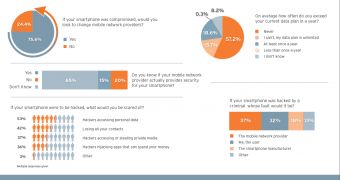According to a study performed by Opinion Matters on behalf of security platforms provider Crossbeam Systems, 75% of smartphone users from the United Kingdom would move to another company if their mobile network providers suffered a security breach.
The figures show that 79% of women and 70% of the men who participated in the survey would change networks if the operator were to become the victim of hackers, malware or other cyber threats. On the other hand, only 63% of customers would change service providers because of high monthly costs.
“Smartphone users, like most people, don’t think about the security of their devices until they’ve been hacked. This may be misleading mobile network operators to focus less of their attention on customer security and underestimate the risk it creates,” said Peter Doggart, senior director of global marketing at Crossbeam.
“There is an inadequate level of investment in security compared to other areas of the mobile network,” he added.
“This is a wake-up call for service providers, especially as we’re reaching a critical mass of smartphone users worldwide, not to mention a critical mass of data-enabled endpoints connecting to mobile phone networks including smartphones, tablets, eBook readers and more. The quantity of threats directed at mobile devices and their level of sophistication are on the rise.”
The study has also found that, when it comes to the safety of the information stored on smartphones, over half of the 1,076 respondents are most concerned about their credit card numbers and passwords.
42% of UK users are concerned about losing their stored contacts and 37% are worried about their private media files being accessed and copied.
The bad news for mobile network providers is that 38% of their customers would rush to blame them if their device or service were hacked. Only 18% of the victims of a cybercriminal operation would blame the device’s manufacturer or the operating system.
While 85% of participants don’t know if their mobile operators have instated any security measures to protect their phones, only 25% of them have deployed any protection applications.
“The results indicate that mobile network providers will be blamed, regardless of who’s at fault. This, more than anything, reveals an important opportunity for providers to be proactive about securing their networks in order to gain customers and minimise churn,” Doggart explained.
“As smartphone attacks become more prevalent, the service providers who anticipated the increased need for security and took the time to prepare will be in the best competitive position.”

 14 DAY TRIAL //
14 DAY TRIAL //